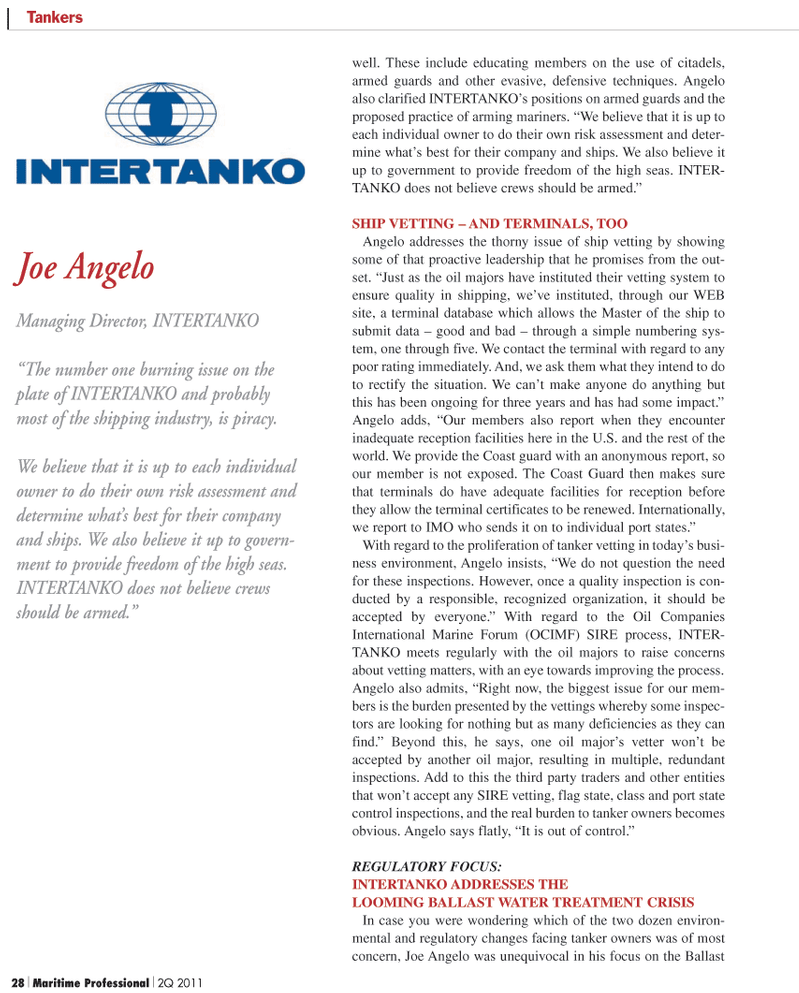
Page 28: of Maritime Logistics Professional Magazine (Q2 2011)
Energy Transportation
Read this page in Pdf, Flash or Html5 edition of Q2 2011 Maritime Logistics Professional Magazine
28 Maritime Professional 2Q 2011
Tankers well. These include educating members on the use of citadels, armed guards and other evasive, defensive techniques. Angelo also clarified INTERTANKO’s positions on armed guards and the proposed practice of arming mariners. “We believe that it is up to each individual owner to do their own risk assessment and deter- mine what’s best for their company and ships. We also believe it up to government to provide freedom of the high seas. INTER-
TANKO does not believe crews should be armed.”
SHIP VETTING – AND TERMINALS, TOO
Angelo addresses the thorny issue of ship vetting by showing some of that proactive leadership that he promises from the out- set. “Just as the oil majors have instituted their vetting system to ensure quality in shipping, we’ve instituted, through our WEB site, a terminal database which allows the Master of the ship to submit data – good and bad – through a simple numbering sys- tem, one through five. We contact the terminal with regard to any poor rating immediately. And, we ask them what they intend to do to rectify the situation. We can’t make anyone do anything but this has been ongoing for three years and has had some impact.”
Angelo adds, “Our members also report when they encounter inadequate reception facilities here in the U.S. and the rest of the world. We provide the Coast guard with an anonymous report, so our member is not exposed. The Coast Guard then makes sure that terminals do have adequate facilities for reception before they allow the terminal certificates to be renewed. Internationally, we report to IMO who sends it on to individual port states.”
With regard to the proliferation of tanker vetting in today’s busi- ness environment, Angelo insists, “We do not question the need for these inspections. However, once a quality inspection is con- ducted by a responsible, recognized organization, it should be accepted by everyone.” With regard to the Oil Companies
International Marine Forum (OCIMF) SIRE process, INTER-
TANKO meets regularly with the oil majors to raise concerns about vetting matters, with an eye towards improving the process.
Angelo also admits, “Right now, the biggest issue for our mem- bers is the burden presented by the vettings whereby some inspec- tors are looking for nothing but as many deficiencies as they can find.” Beyond this, he says, one oil major’s vetter won’t be accepted by another oil major, resulting in multiple, redundant inspections. Add to this the third party traders and other entities that won’t accept any SIRE vetting, flag state, class and port state control inspections, and the real burden to tanker owners becomes obvious. Angelo says flatly, “It is out of control.”
REGULATORY FOCUS:
INTERTANKO ADDRESSES THE
LOOMING BALLAST WATER TREATMENT CRISIS
In case you were wondering which of the two dozen environ- mental and regulatory changes facing tanker owners was of most concern, Joe Angelo was unequivocal in his focus on the Ballast
Joe Angelo
Managing Director, INTERTANKO “The number one burning issue on the plate of INTERTANKO and probably most of the shipping industry, is piracy.
We believe that it is up to each individual owner to do their own risk assessment and determine what’s best for their company and ships. We also believe it up to govern- ment to provide freedom of the high seas.
INTERTANKO does not believe crews should be armed.”

 27
27

 29
29
